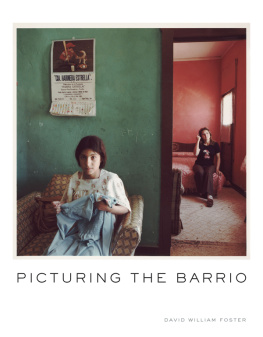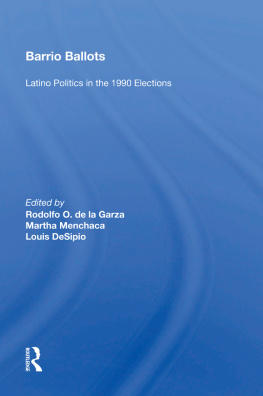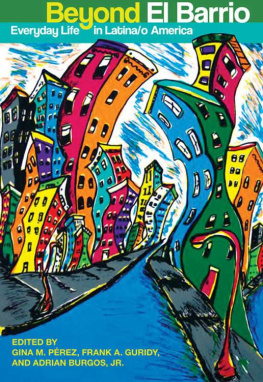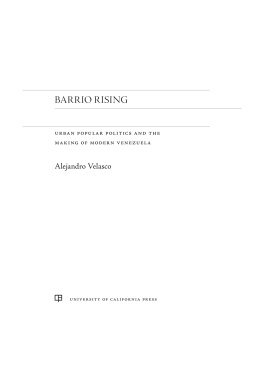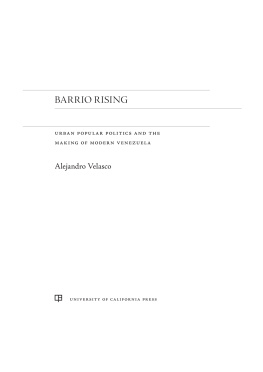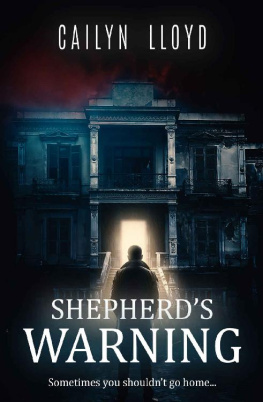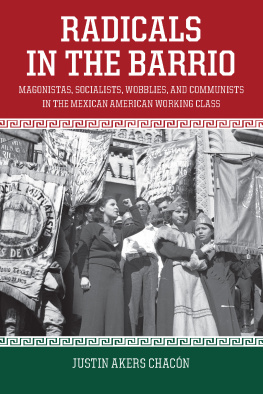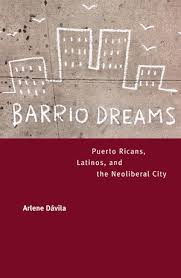Barrio Professors
First published 2008 by Left Coast Press, Inc.
Published 2016 by Routledge
2 Park Square, Milton Park, Abingdon, Oxon OX14 4RN
711 Third Avenue, New York, NY 10017, USA
Routledge is an imprint of the Taylor & Francis Group, an informa business
Copyright 2008 Taylor & Francis
All rights reserved. No part of this book may be reprinted or reproduced or utilised in any form or by any electronic, mechanical, or other means, now known or hereafter invented, including photocopying and recording, or in any information storage or retrieval system, without permission in writing from the publishers.
Notice:
Product or corporate names may be trademarks or registered trademarks, and are used only for identification and explanation without intent to infringe.
Library of Congress Cataloging-in-Publication Data
Rogler, Lloyd H. (Lloyd Henry), 1930-Barrio professors / Lloyd H. Rogler.
p. cm.
ISBN 978-1-59874-114-8 (alk. paper) -- ISBN 978-1-59874-115-5 (pbk. : alk. paper)
1. Social scientists--Fiction. 2. San Juan (Puerto Rico)--Fiction. 3. New Haven
(Conn.)--Fiction. I. Title.
PS3618.O48B37 2008
813.6--dc22
2007044329
Hardback ISBN 978-1-59874-114-8
Paperback ISBN 978-1-59874-115-5
Cover and interior design by Lisa Devenish, Devenish Design Cover image: The engraving High Tide is by Carlos Raquel Rivera. Born in Yauco, Puerto Rico in 1923, he died in San Juan in 1999. He was one of the founding members of the Centro de Arte Puertorriqueo in 1950. Aside from his activity in the Taller-Galeria Campeche, he worked in the Taller de Grfi ica of the Divisin de la Comunidad from 1953 to 1963 designing and illustrating posters and books. An ardent supporter and demonstrator in favor of Puerto Rican independence, he was the first graphic artist in Puerto Rico to design a poster that expressed dissident political views. Engraving Courtesy of Waterfront Press.
Contents
Many of the habits I acquired during years of writing in the social and biomedical sciences made the writing of the fictitiously embellished tales in this book an uncertain venture. Such habits cannot be easily suspended. Thus the encouragement and support I received from other persons were necessary. I would like to acknowledge the help of the following persons.
Kal Wagenheim, an experienced professional writer with an intimate knowledge of Puerto Rican culture, gave me valuable advice on the overall character of my effort. Kai T. Erikson has given me many years of generous professional support. The insightful and lucid observations of Melvin L. Kohn clarified what this book attempts. Renato D. Alarcons sensitivity and good will influenced the vision that went into the writing of this book.
E. Doyle McCarthy, my good colleague, provided assistance at critical moments. Warmest thanks to Philip Sicker, also a university colleague, for his incisive observations and appreciative comments of several chapters. Jennifer Collier, Senior Editor, Left Coast Press, reacted to the chapters with the enthusiasm an author needs. Tara Steplowski helped with her considerable knowledge of computer procedures and gave me sage advice on how to bring this book to the attention of others.
Stasia Madrigal, a friend of many years, who has worked with me for over three decades, assisted in the editing of the manuscript and, throughout the writing of the book, gave me insights, the benefit of her intelligence and thoughtful advice. I am grateful to her.
My greatest debt is to my wife, Susan, who never ceased to believe that I could learn to write fiction. Her natural ebullience and steadfast interest helped me to overcome the doubts and predicaments that accompanied such learning. We had what must have seemed to her to be unending discussions of the book, but her confident optimism gave meaning to the entire effort. Susan, muchas gracias.
More than fifty years have now elapsed since I began to conduct social science research. During each of those years I was deeply involved in some phase or phases of the research process: the funding and administering of research projects, the formulation of research problems, the collection and analysis of qualitative and quantitative data, and the writing and publication of research findings. There were also numerous involvements in the neighborhoods and households of the persons being studied to interview and observe them and, quite often, to get to know them. During those very same years, however, I also wanted to write fiction. Literature had always been a source of great enjoyment and learning to me, and I wanted to see if I could make a contribution to it. A few years ago, in anticipation of my retirement from university responsibilities as a professor, I became a student in a number of creative writing programs. I then did what most authors do and most writing programs recommend: to paraphrase, Draw from your own experiences, and write about something that is familiar. Barrio Professors, the first book-length product of my literary efforts, intertwines fiction and nonfiction.
The book draws from my experiences as a participant observer in research projects. In participant observation the researcher is the essential vehicle of observation, and she or he must give devoted attention to the persons who are being studied in their own social situations, not to variables and measurements. Since the method requires direct personal involvement in social relationships, it yields dynamic portraits of human scenarios. Persons are seen engaged in social interactions. Such scenarios inspired the tales in this book.
The tales reflect my early research experiences in the slum neighborhoods of San Juan, Puerto Rico, and in the inner-city Hispanic neighborhoods of New Haven, Connecticut, from 1957 to 1968. (Some of the material for Chapters 6 and 7 in this book came from Trapped: Families and Schizophrenia,1 which I authored with August B. Hollingshead, and from Migrant in the City: The Life of a Puerto Rican Action Group.2) They depict episodes in the lives of economically impoverished Puerto Ricans caught in the vortex of social change: in Puerto Rico, explosive population growth, emigration, and the wrenching change from a traditional to an urban, industrial society; in New Haven, the chaos of urban redevelopment, poverty programs, and the havoc wrought by inner-city riots. They describe the wretchedness and passion in the lives of these Puerto Ricanstheir loves, failures, courage, and minor victories. I call them barrio professors because of the lessons they impart while confronting vicissitudes in their difficult lives. The episodes in their lives are narrated with relentless attention to the centrality of their Puerto Rican culture. I have tried to tell the tales in easy-to-read prose, with sardonic humor that is not unusual to their lives.
The books organizing principle is my change from a youthful graduate student commitment to experimental sociologywhich is practiced in university laboratories and other confined settings, is narrowly focused, and is heavy with measurements and tightly structured research designsto an abiding belief in a naturalistic sociology that searches for strategic points of observation in the events that unfold in life. The change, however, was not rationally planned or implemented: it was nudged ahead silently by my relationship with persons I met while conducting research. The spontaneous moments they created could not have been foreseen, but, still, without their knowing it, what I learned inadvertently from them coincided with the teachings of my father, Charlie: study social life as it presents itself, not as contrived by experiments. The conversations with Charlie described in the Epilogue supported my change from an experimental to a naturalistic sociology.


